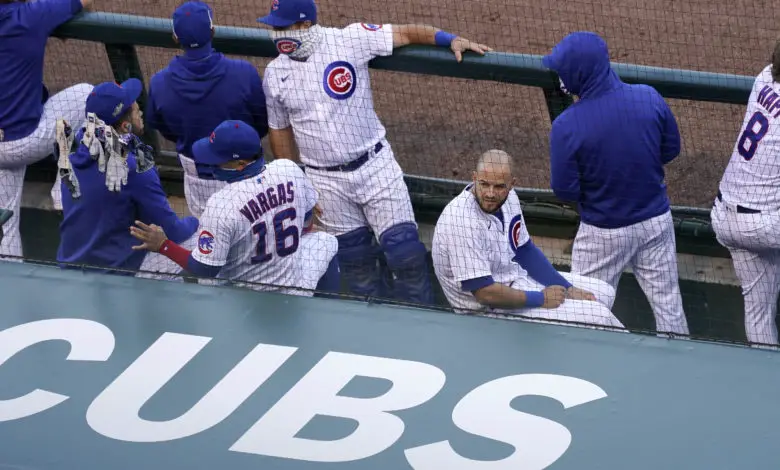
‘It Just Sucks’: Cubs Live Down to Expectations in Anemic Playoff Exit
To paraphrase the late Dennis Green, the Cubs are who were thought they were. The NL Central champions’ 2020 season is over following consecutive losses to the Miami Marlins in which they scored a total of one run. That gave them 13 games out of 62 in which they scored one or zero runs, or 21% of their total schedule. Not as bad as last year, but it looks a lot worse when you realize that 10 of those instances came in their last 28 games (36%).
It’s difficult, both logically and emotionally, to compare this season to those prior because of the unique circumstances involved. Starting and stopping, playing 102 fewer games, and following COVID-19 safety protocols created an environment unlike any other these players had faced.
“I’m proud of them,” David Ross told the media after the game. “This is a season like no other. And the way they came in every day and worked with a good attitude and energy, as their manager, I’m very proud of this group.”
Ross should absolutely be proud of the way his team came together as a unit, making it through the season as the only team without a single positive COVID result. They were basically unchallenged for the division lead throughout the entire schedule, taking the lead early with a 13-3 start and staving off competitors at various points thereafter.
And yet, some of the same troubling trends cropped up late in the season as the bats went cold. Several players had been that way all season, but it got to the point where you felt one run by the opposition was an insurmountable lead. Such was the case Friday afternoon, when Garrett Cooper took Yu Darvish deep for a solo homer that gave the Marlins all the offense they’d need.
“Just numb. It just sucks,” Anthony Rizzo said following the loss. “Offensively, we just couldn’t get it going at all throughout the year.”
Ross said the offensive futility was “uncharacteristic of who they are,” but that simply isn’t accurate when you’re talking about a core that has remained largely intact since 2015. Remember when Theo Epstein said the offense “broke somewhere along the lines” during his postseason presser? That was after a 2018 season in which they scored one run or less in 40 of 164 total games, including Game 163 (a 3-1 loss to Milwaukee) and the Wild Card (a 2-1 loss to the Rockies in 13 innings).
The Cubs averaged 4.66 runs per game in that ’18 season, better than the 4.42 they mustered in their recently concluded campaign. Hell, they scored 5.02 runs a game last season and didn’t even manage to qualify for the postseason. So in a way, Ross is right when he says that the lack of scoring doesn’t necessarily fit with the past few years. The inability to score consistently, though, that’s par for the course.
After scoring 10 runs over seven games heading into their tilt on the South Side, the Cubs touched the White Sox up for 25 runs in three games. Then the offense went completely dormant against a Marlins team that boasted a pair of young hurlers with more gas than a chili cook-off. Thing is, the Cubs were swinging through center-cut fastballs left and right, then sat and watched as Brandon Kintzler salted the series away.
The former Cub’s performance in Game 2 offers just about as perfect an allegory for the home team’s season as you’ll find anywhere. The 36-year-old righty had only struck out three or more batters nine times in 458 career appearances (including four previous playoff games) and had struck out the side on just three previous occasions. The most recent of those came on April 2, 2013 — the first game of the season — when he was with the Brewers. Seven and a half years later, he sat three Cubs down on strikes following a leadoff double to Jason Heyward.
It’s uncanny, unthinkable, and flat-out unacceptable. What’s more, it’s probably unavoidable next season. Epstein has already gone on record as saying the budget is going to be very tight and Tom Ricketts lamented the “biblical losses” of this fan-less season. Though they’ve got several contracts falling off the books, failing to avoid the competitive balance tax threshold this season (based on projections) almost certainly means the front office will be forced to get and stay well under for 2021.
It’s also impossible to ignore what Ricketts said last October and then again in January, when he openly downplayed the idea of spending in free agency. He pointed to the Padres and Phillies, both of whom missed the playoffs after spending big heading into 2019, as cautionary tales and emphasized the need to develop from within. Of course, that Padres talk is looking like an ice-cold take these days.
“Ultimately, it’s great to have the financial resources that we do,” Ricketts told 670 The Score. “It’s an advantage and there’s no doubt about it, but the real key is you have to develop players. You can’t really buy teams, you have to build them. I think everybody in baseball understands that, our guys know that.
“And we have to really just re-focus on drafting well and then working on a lot of newer analytics and newer strategies for developing players to get their maximum potential. And that’s really what our challenge is now looking forward.”
The other major factor here is that the Cubs don’t really have any trade chips left because their young stars are coming off of career-worst seasons while also having limited control and rising salaries. Kris Bryant has battled significant injuries in each of the last three seasons and should get about $20 million in arbitration for his final year of control in 2021. Javy Báez appeared completely lost at the plate all season, but will be earning more than $10 million next year. Kyle Schwarber likewise had a disappointing campaign.
The coke boat has sailed on any kind of massive prospect haul for any of them, so the only option outside of a non-tender or salary dump trade is to hope they bounce back. Those players exploding next season with incredible performances is probably more likely than all of them repeating this year’s anemic efforts, but the Cubs have pinned their hopes to a collective resurgence each winter for the last few years. They may have to run it back one last time, perhaps with some younger pitchers thrown into the mix, because they’ll have no other choice.
I’m admittedly being a little myopic here because I’m frustrated with the way the season ended and I have zero faith in ownership to do anything different than exactly what has been indicated for the past two years or so. This is the bed they’ve made for themselves and now they get to sleep restlessly in it. But hey, it’s not all bad: Having low expectations means not being disappointed.

